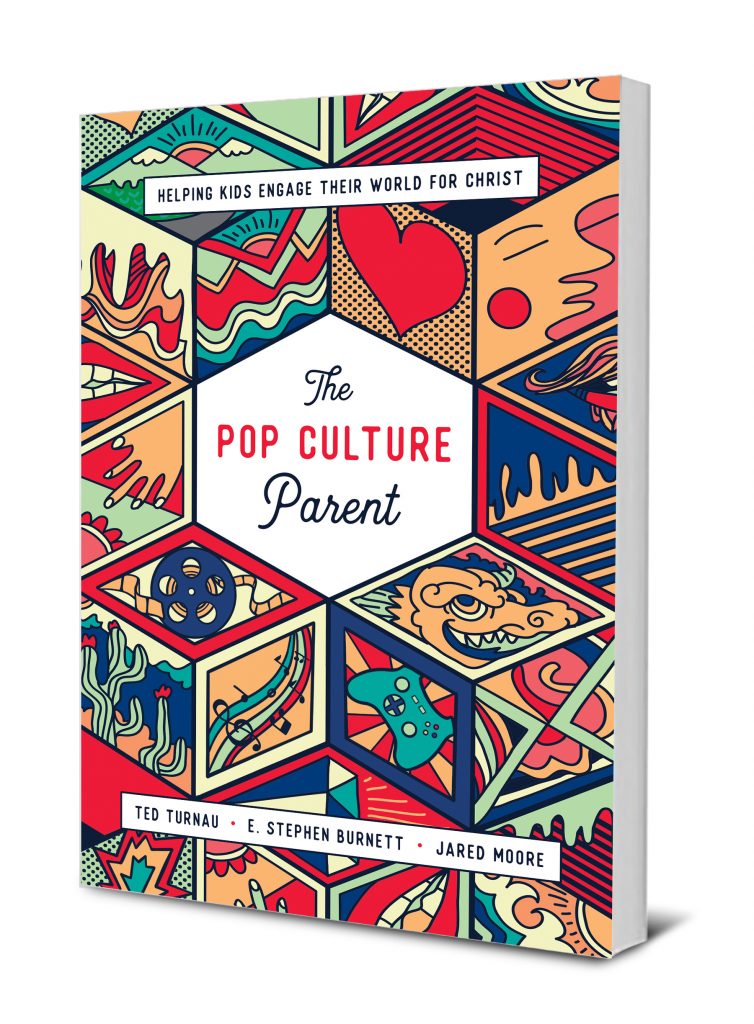Parents often feel at a loss with popular culture and how it fits in with their family life. They want to guide their children well, but it can be overwhelming to navigate the murky waters of television, movies, games, and more that their kids are exposed to every day.
Popular culture doesn’t have to be a burden and shouldn’t be feared. In The Pop Culture Parent: Helping Kids Engage Their World for Christ, authors Ted Turnau, E. Stephen Burnett, and Jared Moore provide Scripture-based, practical help for parents to enjoy the messy gift of popular culture with their kids.
In this interview, the authors share the importance of culture in the life of Christians, why it’s important to know more about your child’s interests, and what questions you should ask.
Q: Why do Christian parents need to be aware of what’s going on in regard to the pop culture their kids enjoy?
Ted Turnau: The popular culture your child enjoys shapes his or her inner life and imagination. Beloved shows, songs, stories, and even memes become nostalgic landmarks that your child will look back on with affection. The current popular culture that his or her peer group is into is the place where your child will find acceptance. Liking the right things is huge. Popular culture has such a huge influence that no parent who wants to really understand their child will ignore it.
Further, understanding your child’s world presents a huge opportunity. Popular culture often circulates around the important moral and spiritual issues of the day. If you want to know what the culture makers think on any given topic, popular culture is a valuable resource. Knowing your child’s interests gives you an entrance into talking about important issues: life’s meaning, death, sex, work, play, money, and possessions. If you as a parent want to talk about these issues—especially in light of the gospel—then you ought to understand your child’s pop culture world.
What makes popular culture so important to understand, especially in raising children, is its breadth. This is the content kids talk about at school or on social media. This is where their enthusiasm is directed. They want to be involved in what is valued by their peer group.
Q: What is the purpose of popular culture in God’s world? What is the Cultural Mandate?
E. Stephen Burnett: Even good Christian resources offering pop culture analysis often react to the values of the day based on personal instincts or traditions we’ve been taught. First, however, we must ask the fundamental question about why all this popular culture is here in the first place! Why on Earth has God let people combine art and technology to create modern stories, songs, music, games, memes, and more?
An old and biblical concept helps explain the purpose of popular culture in God’s universe. Theologians have called this the Cultural Mandate. It’s first mentioned in Genesis 1:28, when God commands Adam and Eve to be fruitful, multiply, fill the earth and subdue the planet. This is a “royal” calling, in which the Creator appoints his image bearers to steward God’s world on God’s behalf. God’s mandate starts with tasks like tilling the earth and planting trees but also includes the more extensive idea of cultivation. We’re creating content. We’re not just harvesting crops, studying science, and developing tools, but we’re creating artistic works like stories and songs. That’s culture. Popular culture is a subset of culture—especially when we use modern technology, such as radio, TV, internet, and the like, to distribute newer forms of stories and songs (and so on) to mass audiences.
Surprisingly, God commands people to unite and start families in the same verse as he commands this making of culture!
Q: We are taught as Christians to be “in the world, but not of the world.” If we’re engaging in popular culture, isn’t that the opposite of what we’ve always heard we should do?
Ted: This is a popular saying derived from John 17:14–18. The problem with the soundbite version is that it isn’t what Jesus is actually saying. Trying to use this as a justification for withdrawing from the world is actually doing the exact opposite of what Jesus says in verse 15, “My prayer is not that you would take them out of the world, but that you would protect them from the evil one” (emphasis added). Why would Jesus pray for protection? Precisely because he is sending his disciples (and us!) into the world, not to be a part of it, but to bring light to it. A better soundbite summary of these verses would be: “Not of the world but sent into the world.”
The larger issue around our relationship to the world has to do with the deeper motivation of our faith. Is our primary goal to protect us and ours from the evil world outside? Or is it to be ambassadors and to train our children to be ambassadors for our King (2 Corinthians 5:20)? To be an effective ambassador, you have to know the culture you are being sent into. Does that mean compromising with the world? No. But it does mean engagement with the world. That’s how we learn the language, categories, anxieties, and dreams of the people we are being sent to. Popular culture is a tremendous training ground, but we cannot give in to fear. Instead, we must equip ourselves and our children to represent and glorify Christ in the middle of the world.
Q: What’s the best way to start connecting with your children’s interests now so that you will be able to have the important spiritual conversations later?
Ted: Rather than artificially forcing heavy conversations onto children, allow these conversations to emerge naturally from the child’s own struggles and fascinations. Being a welcome guest in your child’s world of popular culture is vital here. Instead of standing over the child’s entertainments in judgment, draw alongside them. By drawing alongside your child and enjoying popular culture with him or her, you allow conversations to unfold naturally from the stories, songs, and images your child consumes. In this way you begin to understand your child’s heart, his or her strengths and weaknesses, interests, and so on. Then you will be set up to have limitless conversations in which the gospel can shine.
Q: Is it ever too early to start making biblical connections to your child’s interests? What if you feel like it’s too late to start having those conversations with your teen?
Jared Moore: First, it is never too early to start making biblical connections to our child’s interests. The memories of children are amazing. “Who made you? Who made Elsa (from the movie Frozen)?” “God.” God creates all that is good, whether directly or indirectly. All that children learn for the rest of their lives about God starts with this simple foundation.
Second, it is never too late to start connecting God to our teen’s interests. Everything that is good, true, and lovely in God’s creation comes from God, whether directly or indirectly. Everything our teens love is lovely because God made it lovely. Young children are often satisfied with their parent’s pop culture choices, but teens have their own opinions about pop culture. Most teens and young adults want to show their parents how awesome their pop culture is. Enter their world as a guest, not as a critic, and learn, love, and disciple.
Q: What are the five questions parents should be asking their kids as they enjoy movies, music, video games, etc. together?
Ted:
- What’s the story? Make sure the child understands the plot and character motivations, etc.
- Where am I? What is the moral and imaginary world? Each piece of popular culture projects an imaginary world for us to inhabit. Explore the contours of this world, its style, and its rules.
- Where’s the (common) grace? Look for what the imaginary world gets right, and how it connects with God’s story.
- Where’s the idol, and how can we show how it falls apart? Look for what this imaginary world gets wrong, the false worship woven into this world, and how it doesn’t work or make sense.
- How is Jesus the answer to the hopes of this imaginary world? Look for how the gospel and Christian worldview provide an answer where the idol falls short.
These are questions to guide parents so they can talk with kids about what a piece of popular culture means. Of course, questions and categories will have to be adapted to specific age-groups (we go into more detail about that in the book).
Q: Why is The Pop Culture Parent such an important book for today’s parents?
Stephen: As we learn to pursue our highest purpose to glorify God and enjoy him forever, we must train our children to do the same. We cannot practice “escapism” and yearn to grow in the gospel with our families in a world that does not exist. Instead, we must fulfill this mission in the real world: a world that is filled with popular culture. This will not change. Smartphones will get even faster, movies and TV will get more immersive, and internet access will start jumping from that device in your pocket to your very clothes and appliances. Political movements will keep turning into pop culture/religious movements, more signals will zing through your kids’ bodies, and your kids will keep breathing in this popular-cultural world.
Of course, if we understand popular culture’s original purpose in God’s universe, we shouldn’t fear this change, or even secretly want this to change! This growth of popular culture instead grants parents incredible opportunities to act like Jesus to our children. We can enter their worlds, being aware of their weaknesses (and ours!), yet praise and challenge them in their very enjoyments for the sake of the gospel.
Q: What are some of the case studies you take readers through? How does walking through the steps in these cases help parents apply the same process to other movies, games, etc.?
Ted: We did three case studies in the book, each one geared to a specific age group: the movie Frozen (for preschool to early elementary-aged kids), Star Wars: The Force Awakens (for later elementary and middle school-aged kids), and Fortnite: Battle Royale (for older teens to early twenties, though the game appeals to younger kids as well).
We go into depth in these examples to show parents that there’s a lot of substance to what they might be tempted to dismiss as “mere entertainment.” Each piece opens up a rich imaginary world that kids love to dwell in through their watching or playing. There is a lot to explore, a lot of issues that can be discussed with kids . . . if they sense your interest (even enthusiasm) for what they find awesome.
We present these examples in the book as an encouragement for parents to practice this type of exploration and gospel-centered analysis for themselves. It’s a weird way of thinking and it doesn’t come naturally. But it becomes better with practice. Some readers will find it harder than others. But the main point: don’t get discouraged, and don’t settle for superficial engagement. There are depths here, and your kids will appreciate and learn from a wise engagement with their parents (or youth group leader).
Q: What final encouragement do you have for parents?
Ted: My final encouragement to parents is not to be daunted. You may feel that all this is overwhelming. There are resources available to you, including our book! You may feel you are too busy and don’t have the time. You will find that this is a valuable investment into the wisdom and discernment of your younger brother and sister in Christ, your child. Woven into the rhythms of your life, this can turn into a super fun way of passing on the treasure of the gospel and its perspective on culture to your kids.
Stephen: If you believe in Jesus, he has redeemed you. We can trust him, not only to finish the salvation of his own children, but to help us grow in maturity. In this journey, we can grow out of fear and grow toward seeing our world in light of his gospel. That includes popular culture that God has meant for us to enjoy for his glory. If people had never sinned, we might have enjoyed this gift forever without evil’s corruption. (Maybe after Jesus returns, we will enjoy it again this way.) For now, and with biblical cautions in place, you really can train yourself and your kids to enjoy and discern these stories and songs together.
Jared: The main motivator for a parent in engaging pop culture with his or her child must be love, love for God and love for your child. We must view ourselves as third. Only then will we enter our child’s pop culture world. There we will find God’s awe-inspiring fingerprints, the devil’s idols, and a backdrop for the surpassing beauty of the gospel of Jesus Christ. As we enjoy God’s fingerprints and the gospel with our children, we will find our relationships strengthened and that both we and our children are becoming better disciples of Christ in this messy, beautiful world.
THE POP CULTURE PARENT: HELPING KIDS ENGAGE THEIR WORLD FOR CHRIST
Popular culture doesn’t have to be a burden. The Pop Culture Parent equips mothers, fathers, and guardians to build relationships with their children by entering into their popular culture–informed worlds, understanding them biblically, and passing on wisdom.






